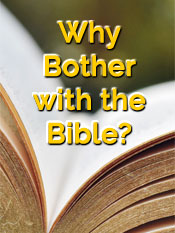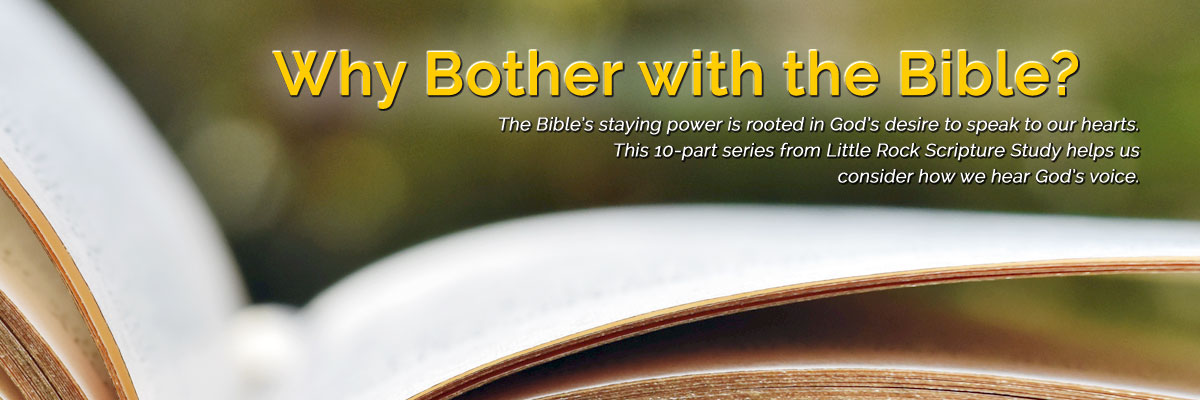Official Website of the
Catholic Diocese of Little Rock
The Word teaches us God’s Truth
Published: April 14, 2018
This is the third column in a 10-part series.
By Cackie Upchurch
Director of Little Rock Scripture Study
Recently, I heard a radio interview with a professor who had once been an evangelical, then what he called a “liberal Protestant” and finally now is an agnostic. He is a learned man and took his faith seriously enough to wrestle with hard realities, and in the end he abandoned faith in God.
 His reason? There is simply too much suffering in the world to believe in a God who would let it continue.
His reason? There is simply too much suffering in the world to believe in a God who would let it continue.
There is indeed too much suffering in the world, but I wonder if this man’s understanding of Scripture stood in the way of allowing God’s Word to fully speak. He indicated that he was raised to believe that the Bible is true in every way, and that prayer is answered for those who believe.
He began to struggle with why some people seem to have their prayers answered and others, such as children starving around the world, do not.
Perhaps we, like the professor I heard, expect the Bible to be “true” in every possible way — historically, scientifically, psychologically — and when we find discrepancies or inconsistencies, we begin to doubt or even abandon all of it, including the God who used this sacred writing to reveal himself.
Our Catholic tradition maintains that the books of Scripture teach “solidly, faithfully and without error that truth which God wanted put into sacred writings for the sake of salvation” ("Dei Verbum," 11).
In other words, the Bible teaches the truth God wants us to know for our salvation, the truth embodied in the person of Jesus Christ who proclaimed the fullness of God’s kingdom. While there are historical underpinnings to sections of the Bible such as the books of Kings or the Gospels or the letters of Paul, the Bible is not written as pure history.
Nor is it written as a science book, especially considering that what was considered science in the ancient world would not stand the test of accuracy by today’s standards. Science asks the question of “how” something occurred, and history asks the questions of “when” and “what” occurred.
The Bible is much more a book that addresses the question of “why”: Why did creation occur? Why does God engage a relationship with mere humans? Why are the commandments the foundation of the covenant? Why did God send his only Son and allow him to die? Why are we bound for new life promised in the resurrection?
When we ponder the larger questions, the “why” questions, we begin to see that the truth needed for our salvation cannot be limited to the simple transmission of facts. This truth goes much deeper. It has to do with God’s loving intention for the world and all its creatures, God’s generosity embodied in his Son, and God’s desire that we love God and neighbor so much so that we begin to embody God’s own generosity and goodness in the world.
As Catholic Christians, we expect to encounter God in the words of the Bible, and we expect to grow more in love with Christ each time we allow God’s Word to speak its simple and profound truths to us. When we pray and study the words of Scripture, we ask at least two fundamental questions of God: What do you want me to know in this reading? How do you want me to change?
And what has Scripture promised and revealed to us about God’s truth? Here are a few ideas:
- God’s generosity cannot be outdone. God’s mercy and love are never withdrawn.
- The suffering and death of Jesus contained within them the promise to be with us in our own suffering.
- The resurrection ensures that suffering is never the final word.
- God sends the Holy Spirit to animate and direct us.
- Prayer is speaking to God, but it is also listening with the expectation of being moved to act, to be God’s love in the world.
- God’s loving kindness, manifest in healing and mercy and justice, is most often accomplished through ordinary people.
Reading the Bible is more than an intellectual exercise; it is a practice that instills in us the expectation that God’s truth will transform us so that we become the vehicles of God’s continuing work in the world. We participate in building the kingdom of God.
Study Questions
- What do you hope to find in the Bible when you read from it or hear it proclaimed at Mass? How might your expectations color what you hear and how you understand it?
- Jesus teaches his followers, “If you remain in my word, you will truly be my disciples, and the truth will set you free” (John 8:31-32). In addition to alert listening to the Liturgy of the Word at Mass, what practices do you have (or might you begin) to help you recognize God’s truth in your life?
- What issues cause you to stretch your understanding of God? How does a prayerful reading of Scripture assist you?
- Can you think of some examples of how Christians have responded to suffering in their midst as a way of responding to God? As a way of demonstrating God’s care?
This article was originally published in Arkansas Catholic April 14, 2018. Copyright Diocese of Little Rock. All rights reserved. This article may be copied or redistributed with acknowledgement and permission of the publisher.




